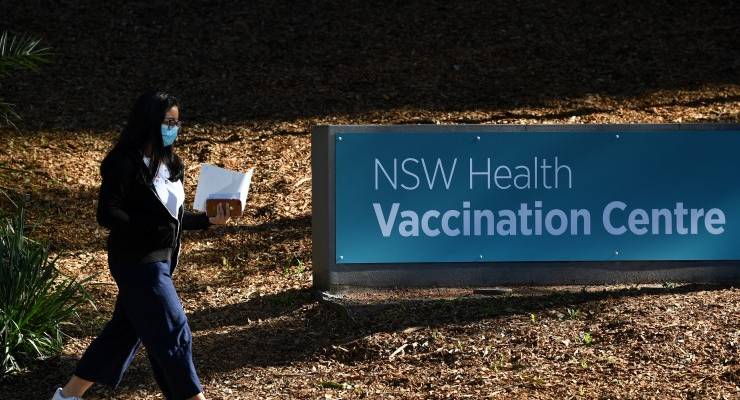
Death concentrates the mind. So, perhaps, does the idea of freedom.
A volley of surveys released in the past 24 hours shows vaccine hesitancy has lessened in Australia as the outbreak of the Delta variant of COVID-19 has grown, along with the lure of freedom promoted by the Morrison and Berejiklian governments in particular.
The open question is: will the promise of freedom day work?
An Australian National University study released today concluded that the willingness of Australians to get vaccinated has increased since August 2020 (when there was no vaccine) and April 2021. The data shows that 93.9% of Australians had either already vaccinated or were willing to get vaccinated and hesitancy had declined for those who hadn’t been vaccinated,
A survey provided to Crikey by ORIMA Research covering the fortnight to September 3 shows 69% had had at least one dose and 20% were seeking or open to being vaccinated — leaving just 10% of the population hesitant or resistant to vaccinations. The 10% figure was a major shift compared with the 31% who were hesitant or resistant in late July.
Among those who were unvaccinated in August, the number of hesitant dropped from 21% to 17% over the month. The proportion who were resistant dropped from 29% to 20%, ORIMA’s research shows. (The ORIMA Covid-19 recovery tracker has covered 25,873 respondents since April 2020.)
The ANU’s data was similar. It found vaccine hesitancy among the unvaccinated had fallen from 17.1% who said they definitely would not or were unlikely to get vaccinated in April to 14.6% in August.
“There is guarantee that a decline in hesitancy amongst the unvaccinated will continue as more and more people get vaccinated,” said study author Professor Nicholas Biddle from the ANU’s centre for social research and methods. “It leaves open the question of if there is a hard core which will remain resistant to vaccination.”
Another survey, released by the Melbourne Institute yesterday, found the percentage of people unwilling to vaccinate stood at 11.7%. And it identified that 8.6% of people were unsure about vaccination. This was a drop (from 9.8%) over a fortnight.
The combined figure of the unsure and unwilling — at 20.3% — prompted a warning from vaccination communications expert Professor Julie Leask that sophisticated communication strategies would be needed if Australia wanted to reach high vaccination coverage of 90%.
The ANU study also shed light on other factors which play into COVID vaccination. It found vaccination rates are lower for those who have relatively low levels of education, those who speak a language other than English, those who live outside New South Wales, and those who have a relatively low household income.
Other groups with low vaccination rates were those who have a fear of infection, are experiencing psychological distress, have low confidence in state/territory governments and report being very religious.








Vaccination should be compulsory, except for politicians who should be denied it.
Only joking, of course.
Godd suggestion however.
Only the LNP.
” It found vaccination rates are lower for those who have relatively low levels of education, those who speak a language other than English, those who live outside New South Wales, and those who have a relatively low household income. ”
Is that because New South Wales received proportionally more of the vaccine than other states?
Other groups with low vaccination rates were those who have a fear of infection
The irony!
You make a very good point, Woopwoop.
Exactly how is the “You can’t go in there/come in here because you’re not vaccinated” going to work? Is Frydenberg going to pay for a monitor/bouncer at every public entrance to every public building, or are shopkeepers and bartenders going to have to tell people to leave? I can see that working well and everybody being compliant.
It’s pretty much how it’s working elsewhere e.g. in various EU nations with vaccination rates, no vacc’n pass no entry, whether a venue or border (like ID reqs in Oz are not questioned, nor need for RSA amongst bar staff).
While several nations have relaxed the need to show a pass to enter cafe, bar etc. during summer, and border crossings by land, it is an option for reintroduction for an expected fourth wave.
Plus of course the fake passes.
“The data shows that 93.9% of Australians had either already vaccinated or were willing to get vaccinated.”
That’s closer to what I believe we will end up with. Why? Because “Death concentrates the mind. So, perhaps, does the idea of freedom.”
I do hope the vaccine reluctant have to endure some period of loss of freedom compared to the fully vaxxed, particularly the over 60 group who have by now had ample time to get a vaccine.